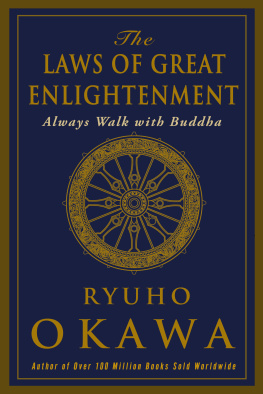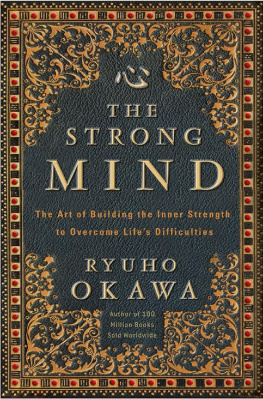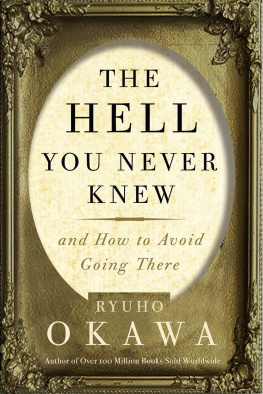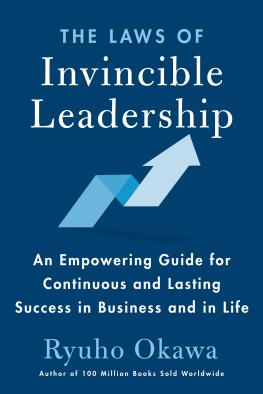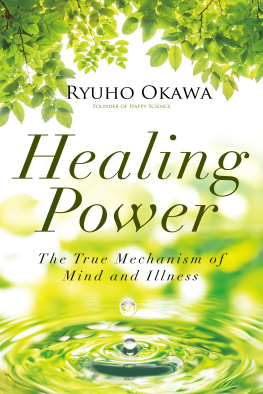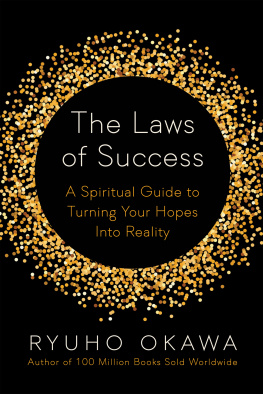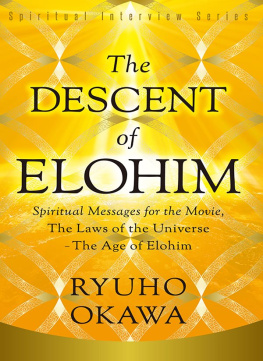Ryuho Okawa - The Laws of Great Enlightenment
Here you can read online Ryuho Okawa - The Laws of Great Enlightenment full text of the book (entire story) in english for free. Download pdf and epub, get meaning, cover and reviews about this ebook. publisher: IRH Press, genre: Religion. Description of the work, (preface) as well as reviews are available. Best literature library LitArk.com created for fans of good reading and offers a wide selection of genres:
Romance novel
Science fiction
Adventure
Detective
Science
History
Home and family
Prose
Art
Politics
Computer
Non-fiction
Religion
Business
Children
Humor
Choose a favorite category and find really read worthwhile books. Enjoy immersion in the world of imagination, feel the emotions of the characters or learn something new for yourself, make an fascinating discovery.
- Book:The Laws of Great Enlightenment
- Author:
- Publisher:IRH Press
- Genre:
- Rating:4 / 5
- Favourites:Add to favourites
- Your mark:
- 80
- 1
- 2
- 3
- 4
- 5
The Laws of Great Enlightenment: summary, description and annotation
We offer to read an annotation, description, summary or preface (depends on what the author of the book "The Laws of Great Enlightenment" wrote himself). If you haven't found the necessary information about the book — write in the comments, we will try to find it.
The Laws of Great Enlightenment — read online for free the complete book (whole text) full work
Below is the text of the book, divided by pages. System saving the place of the last page read, allows you to conveniently read the book "The Laws of Great Enlightenment" online for free, without having to search again every time where you left off. Put a bookmark, and you can go to the page where you finished reading at any time.
Font size:
Interval:
Bookmark:
THE LAWS OF GREAT ENLIGHTENMENT
Always Walk with Buddha
Copyright 2003 by Ryuho Okawa
Originally published in Japan as Taigo no Ho
by IRH Press Co., Ltd., in January 2003
English translation copyright Happy Science 2019
ISBN: 978-1-942125-69-3
PUBLISHED BY:
IRH PRESS
New York
All rights reserved. Without limiting the rights under copyright reserved above, no part of this publication may be reproduced, stored in or introduced into a retrieval system, or transmitted, in any form, or by any means (electronic, mechanical, photocopying, recording, or otherwise) without the prior written permission of both the copyright owners and the above publisher of this book.
eab:20190926
Always Walk with Buddha
Founder of Happy Science
IRH Press
Be the Master of Your Own Mind
Why did Angulimala commit sins? Let us consider this point. He had been training intensely under a Brahmin; he was a good student and had a promising future. But because he was a handsome young man, his teachers wife desired him and tried to seduce him. His rejection of her led the wife to behave resentfully. She lied to her husband, and the angry husband ordered Angulimala to kill a thousand people. Unable to disobey his teachers command, he began to murder, and his mind became so vicious that finally, he even attempted to kill his own mother. Then he met the Buddha and everything changed; by repenting and devoting himself to the Buddha, his past was cleared away and he was able to start a completely new life.
His was indeed a stormy life and just listening to his story, it may have seemed that Angulimalas life was completely at the mercy of external elements. The Buddhist scriptures actually relate this story as if he was not to blame at all. However, was it really true that he had no faults? On consideration, it may not necessarily be the case.
Angulimala was a handsome young man and, to some extent, he may well have had sexual desires typical of a man of his age. Those desires could have been apparent. Although he may not have acted upon them, I assume that there was something in his heart that attracted temptation.
Buddhism has many rules, among them the Five Precepts. For those who constantly observe these precepts an aura called a precept body forms around them, though it cannot be seen. As you observe certain precepts, you will gradually radiate this sort of aura.
For example, if someone has made the decision, I will never kill any living thing and keeps that vow for ten or twenty years, then a distinctive aura will emanate from that person. A teacher has a distinctive air that is specific to teachers, a monk has a monkish air, a judge has a magisterial air, and a police officer the air of a lawman. In the same way, if you undergo spiritual training while observing certain precepts, an invisible spiritual aura known as a precept body will form, and this will protect you from all kinds of temptation.
If you observe the precepts, even if a wrongdoer approaches you to try to tempt you into committing some bad act, he will be repelled like oil to water. When he comes close to you with an intention to deceive you, he will be repelled by something like an aura emanating from you. So he cannot tempt you.
Those who observe precepts have the distinctive aura of a precept body that has formed around them. So even if an evildoer might try to tempt them with the words, I have a good money-making idea. I know where hidden treasure is, so lets go get it! he could not actually bother them, since he would somehow sense that they are unapproachable.
Therefore, those with precept bodies will naturally avoid any possible wrongdoing. Evildoers will tend to stay away from such people because the qualities of their wavelength are so different.
The same holds true for children at school. When children fall into bad company and do something wrong, parents often complain, There are bad kids at school; they lured my child to do this awful thing. However, they cannot necessarily say their child was completely without fault.
There is a spiritual law, the Laws of Same Wavelengths Attraction, and if a child has some element in his or her nature that is attuned to negativity, he or she will naturally be attracted to others with the same tendencies, eventually joining a group of delinquents. If, on the other hand, there is some element within the child that repels wrong, troublemakers will not come near him or her. They will sense, He cannot fit in our company, or She is not like us, and will automatically keep a distance from him or her.
According to the legend, Angulimala was diligently undertaking spiritual training and was highly intelligent and a promising student, but from a Buddhist point of view, it seems his precept body was not yet fully formed and there still was some weakness in his mind. We can assume that there was something in his subconscious that attracted negativity.
Several years ago in Japan, a religious cult committed a serious crime that was similar to the story of Angulimala. At that time, more than ten people died and several thousand were injured. This is a much higher number than the nine hundred and ninety-nine people that Angulimala is said to have killed. Members of this cult were allegedly planning to kill even more people using poison gas and other methods. This means there was a group of disciples who, following their teachers guidance, would have been willing to kill ten thousand people. This is a trap typical of religious cults.
The media reported that it was unbelievable that highly educated peoplegraduates of top-tier universities such as the University of Tokyo, Waseda or Keio University belonged to the cult and that when they were ordered to kill, they did so without any hesitation. Circumstantially, it is very possible because there is almost no correlation of academic ability or intelligence to the emotional problems that arise in relationships between men and women or the ability to distinguish good from evil.
People make mistakes when dealing with the opposite sex regardless of whether or not they are intelligent. Some people, though they are not academically competent, still have highly developed morals and are able to discriminate between good and evil, while others who are academically able may not possess good moral sense.
There is not necessarily any correlation of a persons academic ability or educational background to ones moral or emotional behavior and sensitivities. At school there are no tests for these sorts of issues nor are there any classes that teach such knowledge.
In schools, relationship issues are barely taught. Concerning good and evil, although simple judgments about what is good and what is bad are taught in the early years of elementary school as part of moral education, it is not later taught as a proper academic subject. Therefore, the ability to distinguish between good and evil does not necessarily bear any relation to a persons academic ability; it largely depends on a persons outlook on life, as well as the environment they have experienced.
In the story of Angulimala, the problem lies not only with the teacher who ordered him to kill a thousand people, but also with the disciple who chose to follow a teacher like that and obey his orders without a second thought. This particular teacher-disciple relationship was the result of a lack of wisdom, or to use a Buddhist term, ignorance.
Angulimala thought he could attain enlightenment if he practiced what his teacher told him, but the level of understanding here is the same as that of a company employee who blindly follows instructions. It is the same as saying, My supervisor told me to do it, so I did it exactly as he said. This often happens in companies and government offices.
Next pageFont size:
Interval:
Bookmark:
Similar books «The Laws of Great Enlightenment»
Look at similar books to The Laws of Great Enlightenment. We have selected literature similar in name and meaning in the hope of providing readers with more options to find new, interesting, not yet read works.
Discussion, reviews of the book The Laws of Great Enlightenment and just readers' own opinions. Leave your comments, write what you think about the work, its meaning or the main characters. Specify what exactly you liked and what you didn't like, and why you think so.

